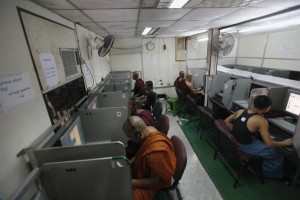Myanmar: Freedom on the Net 2015
By Freedom House • October 29, 2015 Internet freedom in Myanmar declined during the coverage period of this report in comparison with the progress made since the country undertook liberalization in 2011. 1 The government and security forces stepped up intimidation of internet users during social protests, intensifying conflict in ethnic minority regions, and during preparation for the 2015 national elections.
Internet freedom in Myanmar declined during the coverage period of this report in comparison with the progress made since the country undertook liberalization in 2011. 1 The government and security forces stepped up intimidation of internet users during social protests, intensifying conflict in ethnic minority regions, and during preparation for the 2015 national elections.
Since the political reform in 2011, telecommunications has become one of the most dynamic sectors in Myanmar. In 2013, the government granted two international telecommunications companies the opportunity to provide services and infrastructure alongside local firms. Besides creating jobs, the move drove much-needed legal reform. The government passed a Telecommunications Law drafted with input from the international community,2 and Norway’s Telenor Group established the country’s first independent connection to the international internet in March 2014. Qatar’s Ooredoo was the first to launch and offer a mobile phone service to a large part of Myanmar in August 2014. The Ministry of Communication and Information Technology (MICT) released two regulatory laws: “License Provision” in October 2014 and “Networking and Linking” in January 2015.
Download the full report in English here.
Tags: ASEAN, Crimes against humanity, Freedom House, Freedom of Expression, Freedom of Information, Human Rights, Human Rights Violations, Internet Freedom, Political PrisonersThis post is in: ASEAN, Business and Human Rights, Crimes Against Humanity, Human Rights, Law, Military Regime, Political Prisoners, Resistance, Women
Related PostsBurma Partnership Celebrates Continuing Regional Solidarity for Burma and Embraces the Work Ahead for Progressive Voice
Myanmar’s New Dawn :Opportunities for Aung San Suu Kyi and U.S.-Myanmar Relations
Expanding People’ Solidarity for a Just and Inclusive ASEAN Community
Civil society launches #FreeThe5KH campaign in support of the imprisoned ADHOC staff and NEC official
Myanmar logging ban a major step to forest sector reform









 All posts
All posts